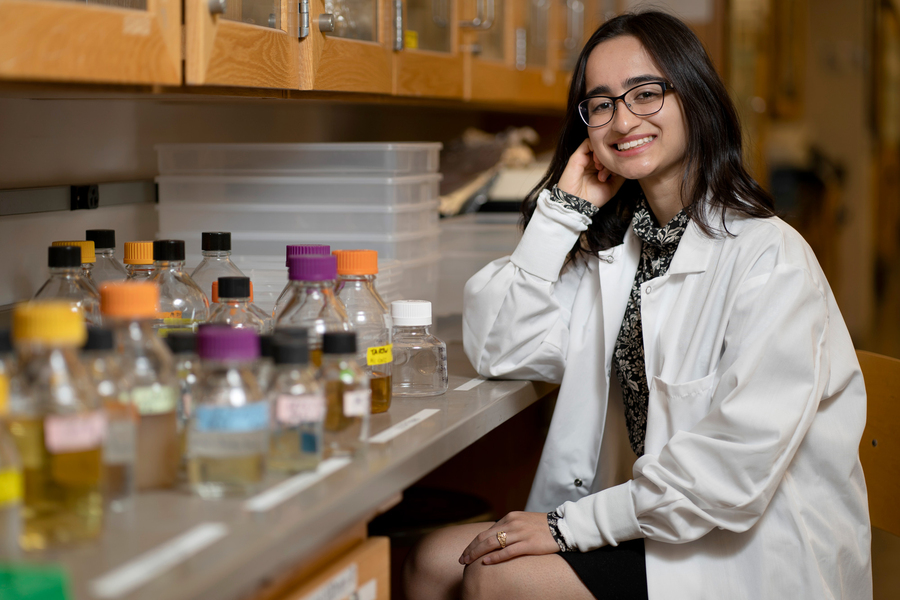PKG Fellow Isha Mehrotra (’22) featured in MIT News!

“Five second rule!” her classmates shouted as they rushed to pick up some food they had dropped on the ground. At that moment, 10-year-old Isha Mehrotra knew what she wanted to do for the annual science fair.
After scouring the internet with her father, Mehrotra learned how to culture bacteria from home, first tossing food on the floor of her kitchen and swabbing samples onto agar plates — her very first microbiology project. She remembers presenting the data to her peers, watching their faces fall as they realized how much bacteria was on the food even after just five seconds. The experience kindled Mehrotra’s love of learning about the natural world, and more importantly, sharing that knowledge with others.
Now a senior studying biology, Mehrotra enjoys the investigative quality of science above all else.
“The more you study science, the more you realize what you don’t know about it,” she says.
MIT has also been a place for Mehrotra to learn more about herself. In the spring of her sophomore year, she worked in the lab of Alessio Fasano with Maureen Leonard at Massachusetts General Hospital’s Mucosal Immunology and Biology Research Center, investigating the blood microbiome of pediatric patients with an autoimmune condition called celiac disease — which Mehrotra herself was diagnosed with when she was a child.
Her diagnosis sparked an early interest in science and medicine. Today, she works to discover more about celiac, its causes, and effects on the individuals who have it, aiming for a future in which patients can be treated effectively or avoid getting the disease altogether.
Through her research experience, which has included publishing her work as a first author in the journal Current Research in Microbial Sciences, Mehrotra has learned that when presenting her findings, having faith in her work is half the battle, especially when challenging canonical scientific beliefs. “At the end of the day, you know, your data is your data. And presenting that with conviction and confidence is something that I’ve learned how to balance. I try to do that even when I’m acknowledging that there are various aspects of the work that have yet to be understood or validated,” she says.
Mehrotra also serves as a member on the Board of Directors at Boston Children’s Hospital Celiac Kids Connection, where she works to build a safe space for children with celiac. She she understands firsthand the physical and emotional toll celiac disease can have, and values the opportunity to learn more about how to support people and navigate these challenges. For instance, she recognized the connection of food insecurity to celiac early on, as celiac is treated with a gluten-free diet. One of her most fulfilling projects, funded through the PKG Center at MIT, has been helping reduce gluten-free food insecurity exacerbated by the pandemic, working with a team at Children’s to research and mitigate these food access issues.
“It comes back to looking at things in different ways. How can I have a great impact in one area if I don’t consider all the various facets of it?” she asks.
In her classes, Mehrotra has also been drawn to complex public health topics with multiple perspectives, developing an anthropology background via her HASS coursework (for which she was named a Burchard Scholar) and an entrepreneurial framework by participating in MIT Sandbox. In January 2020, she took HST.434 (Evolution of an Epidemic), travelling to South Africa to study the evolution of the HIV/AIDS epidemic in the area. The experience was eye-opening for Mehrotra; she saw firsthand the variety of factors — social, political, biological — needed to approach a singular issue.
Continue reading the rest of this article on the MIT News website!
Tags: Health, Health & Medicine, PKG Fellowships
